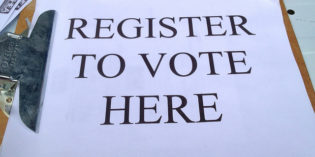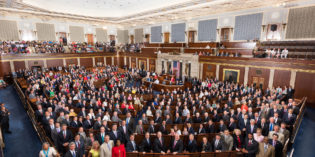Elections and electoral systems

Lawful residence rather than the possession of a particular passport should generate the right to vote
In this post Dr. Heather Green, Senior Lecturer, considers the law setting the franchise for the referendum on the UK’s membership of the European Union, which takes place on 23 June of this year. She argues that lawful residence should determine the right to vote, rather than the possession of a UK passport. Similar PostsWhat […]

There’s a lot more to undecided voters than you might think – and they will be crucial to deciding the EU referendum
The heat is on, as both sides urge voters to choose ‘leave’ or ‘remain’ in the run-up to the UK’s historic EU Referendum on 23 June. New polls are coming in thick and fast, but while the outcome is uncertain, what is certain is that many voters have yet to decide. The ‘Don’t Know’ voters […]

The negativity of the EU Referendum campaign undermines democracy
The referendum debate is not living up to its democratic ideals. Both sides of the divide have focused heavily on negative, fear-based arguments to make their case, which prevent democratic engagement among the electorate. Charlotte Galpin shows how this negativity is inhibiting critical reflection and fostering cynicism. She also notes that the debate is non-inclusive, with […]

What did ITV’s EU referendum debate say about the role of women in the campaign?
The impact of EU membership on women has not played a major part in the UK’s referendum campaign. Following a TV debate on 9 June that featured five female politicians, as well as Boris Johnson, Roberta Guerrina assesses how the EU has affected factors such as women’s employment rights and how these issues could be […]

Can we improve the quality of the referendum debate?
The Treasury Select Committee has said that the EU referendum debate ‘is being poorly served by inconsistent, unqualified and, in some cases, misleading claims and counter-claims’. Alan Renwick asks whether there is anything that can be done about this. He identifies a number of possible mechanisms for identifying falsehoods and enforcing truthfulness, but warns that there […]

If it’s broken, fix it! Time to rethink the AMS electoral system in Wales
Diana Stirbu and Laura McAllister discuss the limitations of the Welsh Additional Member System. They write that it is a mockery to call it a proportional system, and argue that it is in danger of alienating voters. They also indicate that its weaknesses may actually be prohibiting the development of a more mature political system. […]

MPs in safe seats are more likely to become ministers
In the UK, the legislature and government are fused, with MPs making up the vast majority of ministerial positions (and members of the House of Lords the rest). Here, Resul Umit examines the relationship between the size of that MP’s majority, and likelihood that they will hold ministerial office, finding a strong correlation. Similar Posts20 […]

Let’s stop the last minute registration rush: It’s time for a complete and inclusive electoral register for Britain
As the deadline for registering for the EU referendum looms, Lord Rennard, Toby James and Oliver Sidorczuk highlight the problem with last minute scrambles and argue that the UK should draw on lessons from abroad to achieve a comprehensive electoral register. Credit: Lynn Friedman CC BY-NC-ND 2.0 Similar PostsIt is time for automatic voter registration in […]

Majoritarian electoral systems are more prone to gerrymandering than proportional systems
Gerrymandering, the practice of redrawing electoral boundaries in order to benefit one or more electoral actor, has a long and infamous history. Here, Ferran Martinez i Coma and Ignacio Lago look at the under-explored area of gerrymandering in a comparative perspective and what link there is between its prevelence and the electoral system in use, finding […]

In coalitions, parties tend to receive their proportional share of ministries
Coalitions are the norm across Europe, where proportional electoral systems tend to be the norm and majority governments are thus scarce. Here, Cristina Bucur looks at ‘who gets what’ and finds that, when the importance of cabinet posts is taken into account, small and big parties alike tend to receive their fair share of the […]


 Democratic Audit's core funding is provided by the Joseph Rowntree Charitable Trust. Additional funding is provided by the London School of Economics.
Democratic Audit's core funding is provided by the Joseph Rowntree Charitable Trust. Additional funding is provided by the London School of Economics.